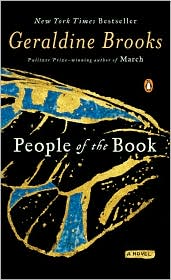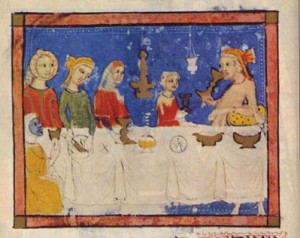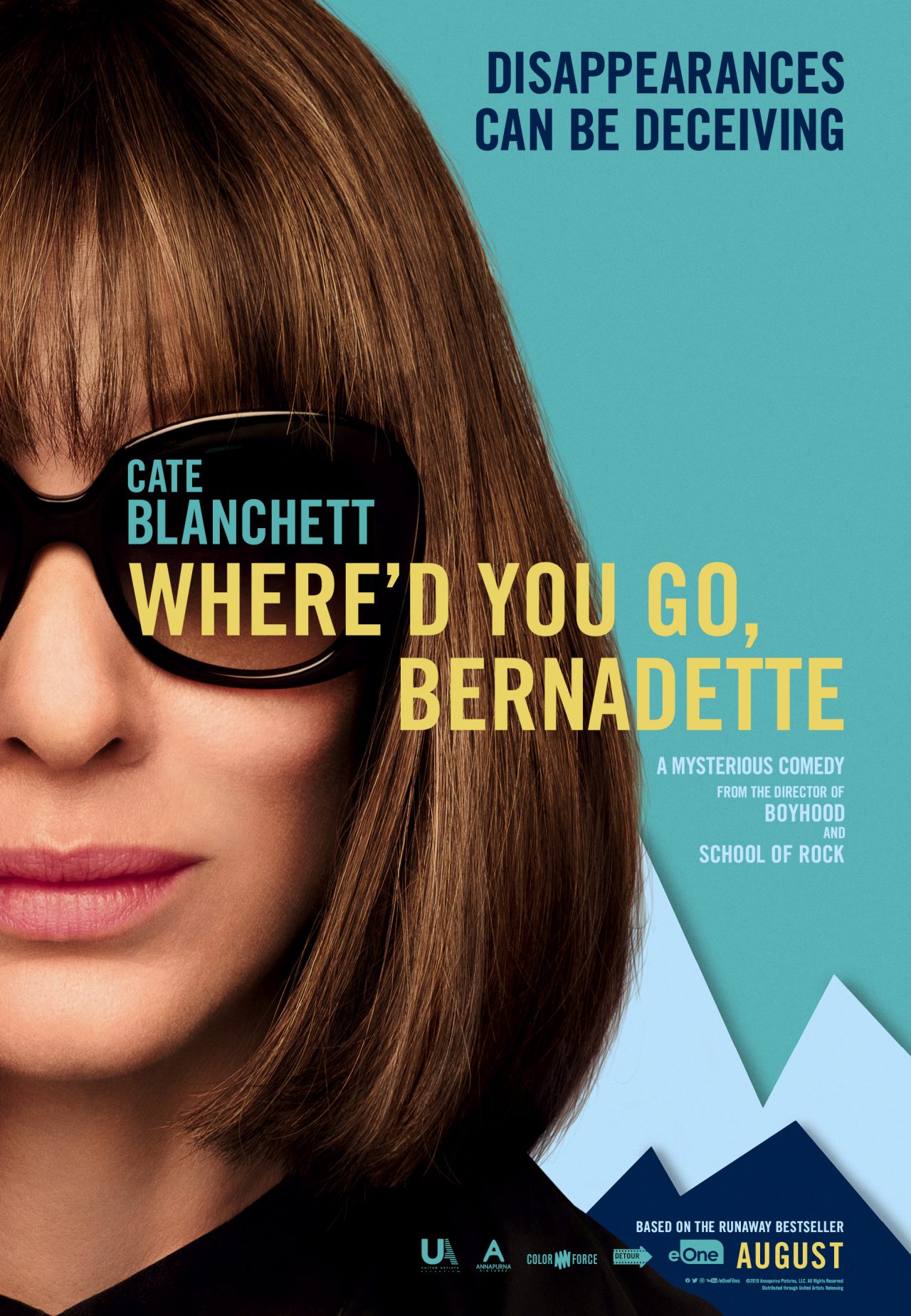People of the Book
I wanted to give a sense of the people of the book, the different hands that had made it, used it, protected it. I wanted it to be a gripping narrative, even suspenseful. So I wrote and rewrote certain sections of historical background to use as seasoning between discussion of technical issues…
 So explains Hanna Heath, the book conservator charged with examining the Sarajevo Haggadah when it is saved from bombing in 1996. Originating in Spain in the mid-14th century, this illuminated manuscript contains the text of the Passover Seder, but it is unusual in that it includes illustrations in an era when Jews considered them to be idolatrous.
So explains Hanna Heath, the book conservator charged with examining the Sarajevo Haggadah when it is saved from bombing in 1996. Originating in Spain in the mid-14th century, this illuminated manuscript contains the text of the Passover Seder, but it is unusual in that it includes illustrations in an era when Jews considered them to be idolatrous.
Hanna might just as well be Geraldine Brooks, author of People of the Book — a title that echoes the term for adherents to faith in the God of Abraham: Jewish, Christian, and Muslim. Brooks uses the Sarajevo Haggadah as a jumping-off point for an imaginative exploration of history that speculates in fiction about the lives of those who created and preserved this manuscript.
The novel has been lauded for its historical detail and factual depiction of the science of book conservation. Hanna serves as the novel’s unifying consciousness, and we learn a lot about her troubled relationship with her mother, her “love” relationship with a Muslim museum director from Sarajevo, and her detective work as she investigates the prime pieces of physical evidence the Haggadah offers as clues to its history: a white hair, a grain of salt, a wine stain, an insect wing, and missing clasps.
This is my third novel by Geraldine Brooks, after Year of Wonders and March. People of the Book will probably be my last read by this author. Though the factual detail is interesting, I was mostly bothered by the severely limited imaginative vision with which Brooks speculates about the past.
One limit is the relentlessly secular mindset brought to bear on this inescapably religious work. The actual Haggadah is not simply a physical artifact, but a book with content and context grounded in the Jewish faith. Yet everyone who plays a part in its preservation is deeply flawed, driven by obsession or lust, or harboring some secret sin. Their belief in the righteousness or truth of God is not transforming; it seems more like wishful thinking. It’s a sordid history in which the fallenness of humanity is trumpeted without any comprehension of faith as something meaningful apart from the status quo cultural practice.
Further, religion is depicted as a divisive, destructive force. The preservation of the Haggadah is used thematically to show Islam, Judaism and Christianity playing nicely together amid the carnage, because those who play a role in its survival come from diverse traditions. It comes to a head in a scene near the end, where Hanna describes the Haggadah in the museum among
the related exhibits — Orthodox icons, Islamic calligraphy, Catholic psalter pages… Each piece has something in common with the haggadah — similar materials or a related artistic style. The point — that diverse cultures influence and enrich one another — was made with silent eloquence.
It’s clear that this exhibit of religious artifacts unplugged from any meaningful context is supposed to serve as a corrective to the historic horror stories of faith in conflict. But the exhibit simply ignores the competing truth claims of the three Abrahamic faiths — the “people of the book.” Faith is simply another artifact here, one with no relevance or meaning in the modern era where Hanna lives.
 Another imaginative limit that has become predictable in Brooks’ writing is a preoccupation with the erotic. In Year of Wonders, this didn’t become apparent to me till near the end, but in March it appeared much sooner, and in People of the Book it’s ubiquitous. The story of the Haggadah, we’re asked to believe, is the story of the sex lives of its stewards throughout history — an Austrian bookbinder with venereal disease, a Jewish bookbinder carrying on an affair, an artist who is raped and develops lesbian tendencies. Then there’s Hanna, who drops casually into the bed of the librarian who rescued the book from the flames. For a novel built so confidently on the progressive view of history, it’s striking to compare the vision depicted here and that of the most primitive ancient cultures organized around fertility goddesses and eroticism. I object to this view, not from a Puritannical impulse to erase the erotic, but from an expansive desire to acknowledge it as one (important) thread in the varied and complex tapestry of Creation.
Another imaginative limit that has become predictable in Brooks’ writing is a preoccupation with the erotic. In Year of Wonders, this didn’t become apparent to me till near the end, but in March it appeared much sooner, and in People of the Book it’s ubiquitous. The story of the Haggadah, we’re asked to believe, is the story of the sex lives of its stewards throughout history — an Austrian bookbinder with venereal disease, a Jewish bookbinder carrying on an affair, an artist who is raped and develops lesbian tendencies. Then there’s Hanna, who drops casually into the bed of the librarian who rescued the book from the flames. For a novel built so confidently on the progressive view of history, it’s striking to compare the vision depicted here and that of the most primitive ancient cultures organized around fertility goddesses and eroticism. I object to this view, not from a Puritannical impulse to erase the erotic, but from an expansive desire to acknowledge it as one (important) thread in the varied and complex tapestry of Creation.
Looking back over all three books, it’s plain that in every case principle and ideal are discredited by animal impulses. No one who is high-minded or who professes faith actually succeeds in living consistently with their beliefs. There are no heroes.
So why did I even finish People of the Book, you ask? Good question. One reason is that I have an unreasoning belief that it’s a good thing to finish a book once you’ve invested a certain amount of time in reading it. The other reason is simpler and probably more obvious: I’m a little slow sometimes. There’s lots to admire in Geraldine Brooks’ writing, but on the whole I rather wish I’d set this one aside early on.




7 Comments
DebD
I also find the lack of religious understanding to be annoying in modern writers. It’s often either evil or non-existent to a historical fiction writer. That’s one of the reasons the “Solitude of Thomas Cave” & the Gil Cunninham series were both refreshing.
My husband and I just finished watching the 4pt. series “Byzantium” via netflix. In many ways we enjoyed the series. The presenter was excellent about describing everyday life and the larger sweep of history, but he just didn’t get religion – especially Eastern Christianity. He always called icons “pictures” and talked about “fire and brimstone sermons” ???(I think he should have known this was 100s of years before the Great Awakening) But, mostly it was as if he only saw the culture through political eyes…as if religion were such a tiny little insignificant piece of the ancient world and really only there to prop up the Emperor.
Polly
I agree. I did like the idea of this book, but pretty much planned not to read anymore of her. I am still making my way through March- not because she isn’t an excellent author but I’m not finding the time to really get into it and I am not particlarly sympathetic to March. I am sure I will get through it eventually.
Janet
Sounds like we’re on the same page on this!
Alice@Supratentorial
I had some of the same thoughts although I don’t think I disliked it as much as you did. I do remember that I found the modern story pretty boring compared to the other stories.
bekahcubed
I found myself nodding all the way through this review–then asking myself “Why did I like this book?”
I looked through my archives in search of my review; but, alas, I had not reviewed it.
As I think back, though, while I’d disliked the same elements you found so distasteful about People of the Book, I think I was so enamored with the art of book conservation and the ability of artifacts to tell stories about the people they have touched (and that have touched them) that my overall impression ended up being favorable.
Janet
I really liked the idea of the book as well. I think some of my strong reaction is disgust with myself for not giving up on the book sooner!
hopeinbrazil
Excellent review. I always enjoy your thoughts – you express them so eloquently!